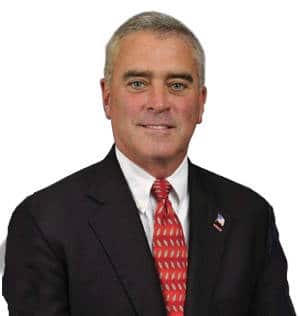
June 6 marked the 73rd anniversary of D-Day. In his 1984 address commemorating D-Day, President Ronald Reagan asked why these men willingly went through the hell that they did on the beaches of Normandy. The answer, he said, was faith. Faith in the mission. Faith that they fought to liberate, not conquer. Faith that if they died, they died with honor, for humanity. Faith in the brotherhood of those they fought alongside.
Last week, the House Veterans Affairs Subcommittee on Health, which I chair, heard testimony from Sebastian Junger, author of “Tribe: On Homecoming and Belonging,” on how the Department of Veterans Affairs treatments and programs can better provide for the health and well-being of our vets. In his book, as Junger explores post-traumatic stress disorder among veterans, he reflects on what soldiers are returning to and what they leave behind when they come home: re-entry into an individualized society, leaving behind the close communal bonds of the brotherhood and sisterhood of war. According to Junger, the same goes for a nation in times of crisis. For example, after World War II, many Londoners who lived through the brutal Blitz claimed to miss the communal underground living that characterized their lives during the war.
Loyalty, inter-reliance, and cooperation – these are three characteristics that Junger assigns to the after-shock of war or conflict. They can be traced in the aftermath of crises throughout history, both on the micro and the macro scale. Think back to Sept. 11, 2001, the most sweeping terrorist attack on American soil and the first confrontation with evil of that scope that many of the current generation can recall. The days following the attack forged the vast, diverse citizenry of America into a single heartbeat, whose coat of arms was the red, white and blue cloth of our nation, and whose enemy had one name. When Osama Bin Laden was killed 10 years later, the front pages of our newspapers were splashed with photos of people in cities across America, draped in flags, fists raised in chants of “USA! USA!”
The good guys won – and those good guys included all 300 million Americans who were cheering together.
On a personal level, Junger finds it a source of stress for veterans when this sense of community is gone, saying: “Having something to fight for, and fight through, is a good and important thing.” It’s not too different for our nation as a whole. When we as a country lose sight of our common goals, our national identity, and the shared values we fight for – and believe in – it weakens us. We become divided, distracted, and mired in gridlock. I believe we can see an element of this occurring in our country today.
It’s not because there aren’t battles to be won. In fact, our country faces threats from all corners of the globe – from ISIS and radical terrorist groups’ recent attacks in Europe, to North Korea’s nuclear capabilities and missile tests, China’s aggression in the South China Sea, or Russian espionage and interference in our election systems. We also face a myriad of challenges here at home. Our health care system is crumbling – just this week, one of Ohio’s largest health care providers announced it is leaving the state’s health care exchange, leaving 18 counties without an insurance option. Our tax code is broken and needs to be overhauled. Our roads, bridges, and highways are aging and need to be rebuilt and repaired.
These are challenges best faced together. They are battles best fought side-by-side. We won’t always agree, and that’s a good thing – robust debate in the marketplace of ideas is a unique underpinning of democracy. But we seem to have forgotten that at the end of the day, here in America, we are all on the same team. A perfect example was Thursday’s Senate Intelligence Committee hearing with former FBI Director James B. Comey. Instead of being treated as a fact-finding mission to reach the collective goal of providing the American people with the truth, it looked more like two competing teams gearing up for a showdown, each hoping that the opposing side goes down in flames. But the reality is, both teams need the same thing: we need facts. We don’t need more fires. And we need focus to get to the bottom of all the allegations and leaks, address any real wrong-doing, and protect our national security first and foremost. Then we need to move forward – together.
It will be impossible to address all threats to the United States, our democracy and founding principles, if we rarely come together as Americans. Practically, this means engaging in civil discourse, finding common ground in shared goals, and having tough conversations – expecting some differing opinions. It means remembering who we are and what we fight for – as we fight through the challenges facing our nation. We are all unique, and our opinions are as diverse as we are, but we are all Americans. It’s this communal bond and American spirit that spurs us to greatness. It’s what sets us apart from the others.
“Out of many, one.” United we stand. Divided we fall.
Congressman Brad Wenstrup represents the 2nd Congressional District of Ohio. He serves on the House Permanent Select Committee on Intelligence, the House Armed Services Committee, and the House Veterans Affairs Committee. He is also an active member of the U.S. Army Reserve.


